|
Source |
The Plough Boy JournalsThe Journals and Associated Documents The Plough Boy AnthologyImage Gallery from the Plough Boy Anthology of 19th Century American Whaling. The Collected Works of William Hussey Macy Dictionaries & Glossaries |
. . . .
HUNTSMEN OF THE SEA.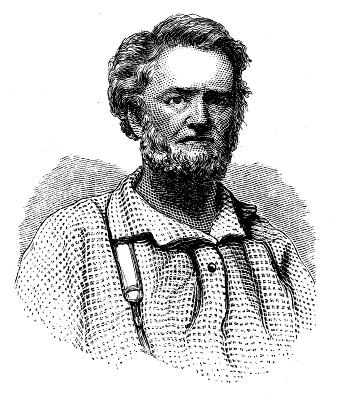 A NIMROD OF THE SEA Within the memory of most of us there was a time when we sought some quiet spot at home to read, undisturbed, a romance of the American whale-fisheries. The subject has charms that commend it to all young readers, since it comprehends at the same time both hunting adventures and the wonders of the deep. We are not surprised. then, at the great number of writers for boys who have chosen this field for the scene of their books. But we are surprised and regretful that none of them ever trusted in the riches it contains, and that they preferred to follow their own imaginations into the wildest impossibilities rather than to gather truths infinitely more interesting. More scientific writers have scarcely done better. Perhaps we should say they have done worse, for they have stated as facts things as flimsy as the flimsiest yarns of the story-tellers. Heretofore there have been no trustworthy authorities on the subject, and for the first time a writer appears with credentials that entitle him to the widest consideration. * He is not a romancer who fabricates his thrilling stories of the sea on dry land, nor a learned Dryasdust, who comes with fresh and sprightly theories from the dissecting-room, but a man from before the mast, who saw and heard with his own eyes and ears all the things that he has written about. His narrative is the unvarnished story of forecastle hand, and its chief merits are its veracity and its picturesque simplicity. In some chapters it is rollicking and brimful of adventure; in others it is sad, and weighted down with the miseries of forecastle life. The descriptions of scenery and the phenomena of the ocean are often so verynaive that if we were not told of their author's busi- * Nimrod of the Sea; or, the American Whaleman. By W. Morris Davis. New York: Harper and Brothers. |
ness, we could easily guess it. The work is eminently one for popular entertainment and instruction and in one of its most absorbing chapters it shows the brilliant development of the American whale trade. Furthermore we have nothing to add, save to reiterate that the whole subject is one of intense interest to old and young, as, we think the material gathered in the succeeding pages will prove. The historical part properly comes first. Some of the adventures will be told later on. In the reign of King Alfred, it is said, there appeared in England a gallant old Northman, who told his majesty wondrous stories about the whales captured by the Finns off the coast of Lapland. Alfred was so impressed with the advantages of the enterprise that he caused the information to be spread through his kingdom, hoping that his people would engage in it. But they did not, and until 1598 there is no further record on the subject. In that year, according to Hakluyt'sVoyages and Discoveries, an honest London merchant wrote to a friend of his, requesting "to be advised and directed in the course of killing a whale." The answer conveyed the information that competent whalemen and tools were to he obtained in Biscay, where the people had been engaged in the hazardous business since 1390. The correspondence resulted in the equipment of a whaling fleet, which met with great success, and was increased until the English were unrivaled in the Greenland fisheries. Things might have gone happily, but the Dutch intruded on English ground, and met with a hearty English welcome. Their tackle and oil were seized, and they were told to depart, under the penalty of losing their vessels also. They submitted, but only until some war vessels arrived to protect them, when they resumed the business, and continued it unmolested. 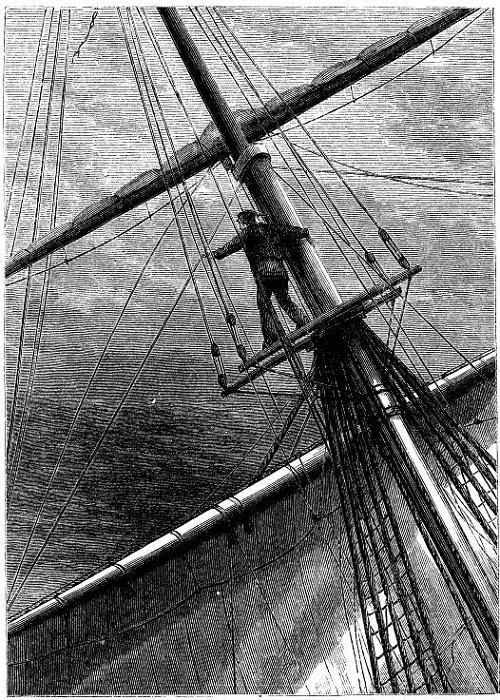 "THERE SHE BLOWS!" Soon afterward the English relinquished the fishery, and did not again occupy it until the time of Charles the Second. In 1618 it is recorded that the whale-fisheries of Holland employed 12,000 men. This is considered an exaggeration; but in a work calledDiscourses upon Trade, published in 1670, the statement occurs that "the Greenland whale-fisheries of the Dutch and Hamburgers have annually 400 or 500 ships, while the English have only one." It is also said that in forty-six years, ending with 1721, the Dutch made 5886 voyages, and captured 32,906 whales, valued at £16,000,000. Emulous of so prosperous a traffic, the English again made determined efforts to recover what they had lost, the government granting bounties to whalemen, and allow- |
ing them exemption from the press-gang. But for some hidden reason the capitalists and tars alike avoided the service, and refused the bait held out to them. The amount of the bounty offered was again increased, and Protestant foreigners were invited to immigrate and avail themselves of all the privileges extended to natural-born subjects; but England, though so grand a naval power, was still unable to muster a whaling fleet or find the stalwart men to man it. The service required strength, pluck, and enterprise. In these things Americans would suit it, and in 1672 the fruit of their toil in the whale-fisheries first appeared in the markets. We helieve there is yet extant the first agreement ever made in America on the subject. In it "James Loper doth ingage to carry on a design of whale catching on the island of Nantucket. That is to say, James ingages to he a third in all respects, and some of the town ingages on the other two-thirds in a like manner." This little spark, Captain Davis observes, kindled a great flame that burned around the world. Work was begun on the smallest scale in boats from the shore by thrifty, industrious, and courageous men. It atttacted the Americans almost as much as it repelled the English, and in 1761 the small island of Nantucket employed ten vessels of 100 tons each. In the year following the number had increased to fifteen vessels, and within twelve months more a magnificent fleet of eighty vessels, all hailing from Nantucket, were afloat in search of whales on the nearest and most distant waters. The whalebone exported from America to Great Britain reduced the price of that material one-third. The British government had thus far expended the extraordinary sum of £1,687,902 in bounties, and were content a while to watch the progress of their colonial subjects in the whale-fisheries; but after the Declaration of Independence they were no longer interested in them, and renewed and added to their offers of bounties. They offered a premium of £600 to the vessel proceeding to the Pacific, continuing four months on the ground, and, after being sixteen months out, having the greatest quantity of sperm-oil on board. Five hundred pounds more were promised to any of the seven vessels having the next greatest quantity. A second invitation was also issued to foreigners, who were allowed to import their goods free of duty and to compete for all the premiums. The pertinacity of the government appears as strange as the aversion of the sailors to an exciting service in which they might be expected to glory. The Americans were never assisted by their government, and depended on their own resources alone. Their success elicited a brilliant eulogy from Burke in the English Parliament; and on the Arctic and Antarctic, the Pacific and the Atlantic, they were unrivaled as hunters of the grandest game in the world. In 1840 the whaling fleet numbered 675 vessels, most of them measuring over 400 tons each, and their total capacity was 200,000 tons. They were manned by 1700 of the hardiest, pluckiest, and most indomitable seamen. Their value was $25,000,000, and they carried on an annual business of $5,000,000. The secret of the success of the Nantucket whalemen is strikingly stated inNimrod of the Sea. They practiced co-operation to perfection. "From the first," says Captain Davis, "the people clubbed their means to build or buy a vessel, and many branches of the labor were conducted by those immediately interested in the voyage. The cooper while employed in making casks took good care that they were of sound and seasoned wood, lest they might leak his oil in the long voyage; the blacksmith forged the choicest iron in the shank of the harpoon, which he knew, perhaps from actual experience, would be put to the severest test in wrenching and twisting as the whale, in which he had a one-hundredth interest, was secured;. the rope-maker faithfully tested each yarn of the tow-line to make certain that it would carry 200 pounds of strain, for he well knew that one weak inch in his work might cause the loss of a fighting monster; the very women and girls who made the clothing remembered in their toil that father, brother, or one dearer yet might wear the garment, and extra stitches were lovingly thrown in to save the loss of a button or the ripping of a seam." Thus it was that the profits of the labor were directly enjoyed by those engaged in it, and the workman's interest was the master's, and the master's the workman's. The English capitalists could not compete with such a hive of co-operationists, although their government aided them with a premium of ten dollars per ton burden of the vessels, protected them by excessive duties on American oil, and granted unprecedented immunities to their seamen. They were compelled to relinquish the honor and the glory and the profit, and to simply watch how others could excel them. For many years to come the commoners of Nantucket, New Bedford, and New London were destined to be masters of the whale-fisheries. No doubt those of you who are young are impatient for a glimpse of life on board a whaling ship, and now that we have shown you how the Americans came to be renowned in the profession, this desire shall be gratified. The excitement, the adventures, the perils, and the prizes of the service very naturally allure many boys of a roving disposition away from home. If you happen to stroll along the docks to-morrow, |
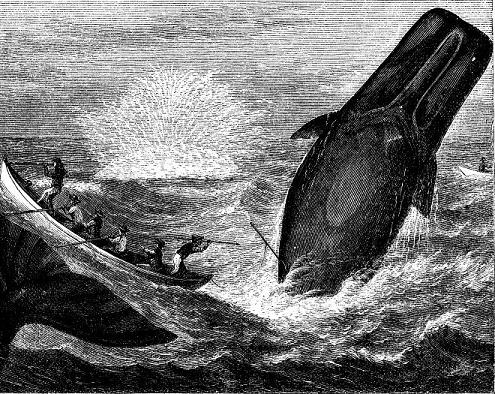 STRUCK ON A BREACH you will see outside some of the shipping-offices such unflatteriug advertisements as, "Greenhorns wanted for whaling voyages." And not far off there will likely be an uncouth lad contemplating it with a wistful eye, ready to obey the first beck of the agent within, and to sign articles for a long three years' cruise. The lad is fearful that the agent will reject him; but usually the agent is as anxious to ship him as he is to be shipped. Captain Davis had the charms of a whaling voyage most eloquently described to him as he stood, fresh from a Pennsylvania farm-house, in a New London shipping-office: "There's fresh beef in plenty; the porpoise is to be had for the catching, and there's muscle in porpoise - it'll stiffen you up, porpoise will. Tben there's albatross as big as geese - a little oily, but you'll get used to that, and it makes a man waterproof to eat albatross." And so the lad, who needs no cajolery, willingly writes his name in a sprawling hand to the articles, and with a pat on the back is sent to the outfitter's store, where he is rigged in kerseys, canvas, and tarpaulin. The whale-fishery is considered one of the best schools for seamen that we have. But the relations between officers and men were as brutal on the vessel in which Captain Davis sailed his first voyage as on most ships in other services. The captain and officers were tyrannical masters, and the men vindictive slaves. The ropes-end and, on one occasion, the revolver were the arguments used to bring refractory sinners to their senses. The officers swore at the men aloud, and cheated them to their faces. The men swore at the officers in an under-breath, and were treacherous in dark corners. Once there was a revolt, the men protecting a lad from the captain's cat-o'-nine-tails. The mutineers were imprisoned without a trial by an ignorant consul of the United States in one of the Hawaiian ports, and were released after many months by a war vessel. Quarrels, threats, blows, and desertions were of frequent occurrence, and out of the large crew that sailed from New London only four or five returned home in the same ship. The good days of co-operation were waning, we should think, when Captain Davis went to sea. But there was never a time when the crew refused to work, or allowed a whale to pass without lowering the boats and cheerfully risking their lives in its capture; and a can of grog was never sent to the forecastle nor a kind word said that did not awaken manifest gratitude in these poor sons of the sea. Considering all things, we think that the sailors were to be blamed least. A pathetic incident is related of the illness of a boy named Beers. He was left alone and unattended, without nourishment or medicines, on a narrow shelf in a foul-smelling, vermin-infested pantry. When one of the forecastle hands found him he was delirious, murumuring the words over |
and over again, "Oh, how lonely to die so far away from home and friends! - how lonely! how lonely!" And when he recovered consciousness he stroked the hand of his comrade and continued in the same strain, "I should not mind dying near the shore in the track of other vessels; but here, so far at sea, how lonely! how lonely!" His spirit was not released until after many hours of suffering, and he died "babbling of green fields." All ills on shipboard were treated by one formula. A powerful dose of Epsom salts was first administered to the patient, and if that effected no improvement, a still more powerful dose of jalap followed, with the ohject of neutralizing the salts. But if neither medicine produced a favorable change, they were supplemented by a potion of calomel that either killed or cured. In the long voyage around Cape Horn to the sperm-whale ground there are few incidents that have not been often described before. The vessel is followed by the flying-fish, the pilot-fish, and the albatross, and in smooth weather the crews are drilled in capturing a dummy whale. A spar is towed astern, and the greenhorns in the boats manoeuvre around it with a great deal of earnestness, and are taught some of the tricks of the trade. But as soon as they reach the Banks of Brazil actual service is due, and each man is alert for the stirring cry from the mast-head, "There she blows!" The ship is under sail during the day only, and in the night she stands by under close-reefed canvas, an arrangement which allows the crew long watches below, and prepares them for hard toil during the day. The captain and mates strain their eyes across the waters, and the humblest deck hand is not less zealous and anxious. When at last the word is heard from aloft, and is repeated quick and oft, the boats are manned with such alacrity and precision as are seldom seen elsewhere. The American whale-boats, by-the-way, are unexcelled in beauty, speed, and durability. They are twenty-eight feet long, swelling amid-ships to six feet in breadth. The gunwale is twenty-two inches above the keel amid-ships, and rises with an accelerated curve to thirty-seven inches at each end. The elevation of bow and stern, and a clipper-like upper form, give them a duck-like capacity to ride advancing waves that would fill and sink ordinary boats. The gunwale and keel are of the very best timber, and are the heaviest parts, giving a firmness to the rest of the structure. The planking is of half-inch white cedar. We scarcely hope that these specifications will interest the landsman, but by them the quality of the boats shall be known to watermen. Let us add that one of these boats can be lifted by two men, and that it will make ten miles an hour in a dead chase by oars alone. The equipment of each consists of a line tub, in which are coiled 300 fathoms of the best hempen cord; a mast and sprit-sail; oars, harpoons, and lances; a small apparatus to extinguish the fires that might be ignited by the friction of the cord drawn from the reel; a water keg, lantern, candles, compass, waif flags on poles, and bandages for wounds. The harpoon is a barbed triangular iron, very sharp on the edges, and the lance is a somewhat similar instrument. There is a modern invention, called a bomb-lance, which is not often found in American boats. It is an iron tube about eighteen inches long, sharp at one end, and provided with elastic wings at the other, which serve as the feathers of an arrow. The tube contains six ounces of powder and a fuse, and is aimed at the whale's vital parts. Sometimes it kills instantly, but it is considered uncertain in fastening, and, as we have said, American whalemen generally avoid it. In boats of such lightness as we have described the royal game of the seas is chased and attacked. His moods are variable, his courage is always the same. Sometimes he is killed by the first dart of the harpoon, and dies a quiet death; at other times he fights for hours at a time, destroys boat after boat, mangles the men, and even charges at the ship itself. Such a vicious customer was one of the first Captain Davis had to encounter. As soon as the harpoon had struck him he swiftly ran a short distance under water, carrying a line with him. Then turning in his course, he rose to the surface, and rushed at full speed, with his head out of water, for one of the boats, which he stove in and rolled over. The captain's boat, in which Davis was bow-oar, came to the rescue; but as the captain saw that the men were not in immediate danger, and that a third boat was approaching, he left them swimming, and attempted to coax the whale away from the wreck, which the enraged monster was threshing with his terrible jaw. Just then the whale noticed the swimmers, however, and rushed toward them, with his jaw at right angles with his body. But before he could reach them a second harpoon was hurled into him, and with that to accelerate his speed, he ran away to the windward, towing the captain's boat in the wake. It was then the duty of the bow oarsman to grasp the fastening line and haul the boat alongside the enemy, so that the lance might be used upon the huge body. But it was impossible, owing to the increasing speed of the whale, and the savage manner in which he tossed his flukes. The captain used an implement called a spade, with the hope of severing the tendons of his tail, and so bringing him to; but the operation was unsuccessful, and he ran with undiminished speed, often rolling as he went, so as to give the flukes |
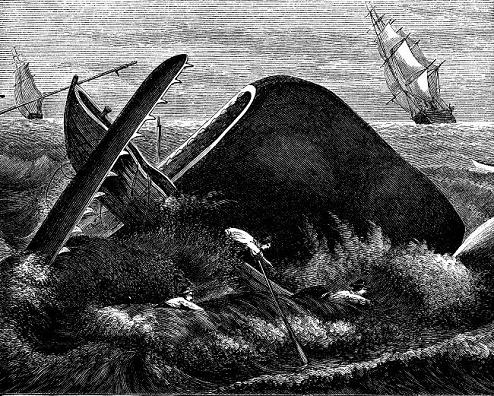 IN THE WHALE'S JAWS. a side-cutting power, with the intention of crushing his little antagonist. Under similar circumstances the ordinary manoeuvre of the hunters is to sheer the boat to one side of the whale by taking a bight of the line over one side of the boat. "In this instance," Davis tells us, "the bow oarsman had been tugging at the line for an hour, but was utterly unable to get the boat in advance of the flukes of the whale. A little line might be gained for a short time, but it would soon be torn through the clinging hands, almost taking the flesh with it. This was certainly very aggravating to the excited captain, who was a religions man, and under his own vine and figtree, with none to rile him, I guess he would average well in the patience line. But with all our troubles on this day, I believe he wished there had been no sin in a ripping oath. "He was a little hard on his bow oarsman, and rather more than hinted at somebody's cowardice. This was too much for my hot Welsh blood, and with the aid of two others I brought the boat right up to the iron in the whale's body, and coolly passed a bight around the thwart and made all fast. The captain was delighted to be held up to his work so well, and plied his lance thrust after thrust; but the brute seemed to have a charmed life. He would not spout blood, and the little jets that came from the lance holes would not bleed a whale to death in a month. Our boat buried her nose in the waves, and the bloody spray leaped over her sides as we swept right royally onward. Now our majestic race-horse grew impatient of the captain's prodding. Hemilled [turned] across our course, and we ran plump against his head. 'Slack line!' roared the captain. 'Starn all! slack line, and starn!' He turned in his tracks to step aft of the bow oarsman, fearing the upward cut of the whale's jaw, when he saw that the line was fast to the thwart. 'For God's sake cut that line!' he shouted, as he sprang forward for the hatchet; but the loosened bight went over the side, as the whale came up under the forward part of the boat, and carried the bow clear out of the water as he rounded slowly forward. "At this moment the captain and old Ben [the harpooner] occupied the stern of the boat, and in the perilous moment I was just mad enough to enjoy the expectant look with which the two old whalemen awaited the arrival of the on-coming flukes. Fortunately for all of us, the blow was delayed a moment, and when the thundering concussion came it cleared our boat by a few feet. The other boats were out of sight, and the ship's hull could be dimly seen to the leeward. For two hours more the whale ran and fought with redoubled energy. The captain got long darts with the lance, bnt with no good effect. The iron drew, and the victorious whale passed from us. |
It was night-fall when the worn-out crew reached the vessel, and found that their comrades, whose boat had been wrecked, were all safe on board. On the next day the green but plucky bow oarsman was told that in fastening the line to the boat he had placed six men within an inch of death. If the whale had gone down, the frail craft and her crew would have been a quarter of a mile under water in less than a minute. More pages than one number of this magazine contains could easily he filled with instances of the heroic daring of whalemen, and the prowess of the game which they seek. An infuriated whale is a vastly more terrible antagonist than the wildest and mightiest of land animals. His courage is equal to his power, and instances are on record in which a sperm-whale, after defeating the men in the boats, has actually rushed upon the ship, stove in her bow, and sunk her. A boat or two lost is usually the smallest cost of an encounter, and often the crew are tossed high in the air by his monstrous flukes, with a bristling shower of harpoons, lances, and splinters following after. Coming to the water bruised and lacerated, the men are still pursued by the enemy, and have to avoid his jaws by diving under or crawling over him, until one of the other boats has an opportunity to dispatch him. Whale ships do not carry surgeons, and the most horrible wounds are dressed unskillfully by the captain, who, in all probability, knows less of surgery than of Latin or Greek. Amputations are performed with carpenter's saws and butcher's knives, and wounds bandaged with canvas. If you should ever meet an old whaleman you may read in his patches and scars the evidence of the manifold perils of his profession. In the pretty cemetery at Sag Harbor, Long Island, there is a marble monument bearing a touching record. It is in the form of a broken ship's mast, with an unstranded hawser twisted around the foot, and engraved upon it are the names of six captains of whale ships belonging to the town, all of them under thirty years of age, who died, within ten years of each other, in actual encounter with the monsters of the deep. An old whaleman who had escaped death several times used to declare that he only lived "on borrowed time, a monument of God's infinite mercy." We may also mention here the case of Captain James Huntling as an example of a whaleman's endurance. His boat was upset and rolled over him by a large sperm-whale. When he rose to the surface he was entangled in the line, and struggled hard to free himself but before he could succeed he was jerked out of the sight of his horrified shipmates. A bight of line yet attached to the whale was around his ankle. Drawing himself nearer the retreating animal, he drew a sheath-knife and managed to cut the cord. When he again came to the surface a boat rescued him and con- 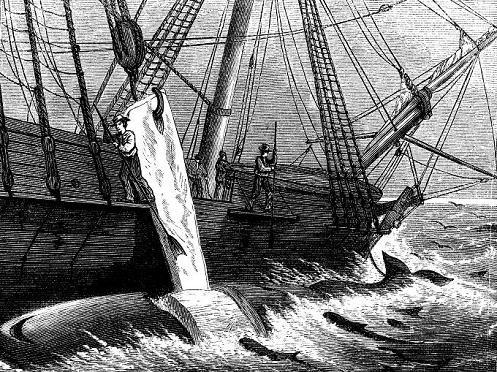 "CUTTING IN." |
veyed him to the ship. His ankle was broken, and in the presence of his men he set it himself, and then resumed his usual duties. Captain Davis mentions a sperm-whale which first wrecked two boats and afterward charged at the ship, tearing away the cut-water and the copper sheathing around the bow. Several harpoons, lances, and bomb-lances were fired into him without effect. During the night he remained on the surface in the vicinity of the wrecked boats, and was frequently heard fighting the fragments. On the following day thirty-one bomb-lances more, each containing half a pound of gunpowder, were exploded in him before he yielded. The monster produced 115 barrels of oil, half of it head-matter, the value of which will be explained anon. Finback whales are even more dangerous than sperm. They are occasionally 120 feet long, and extremely swift and powerful in their motions. But their blubber is thin and the whalebone scant, and they are considered less valuable than others of the species. 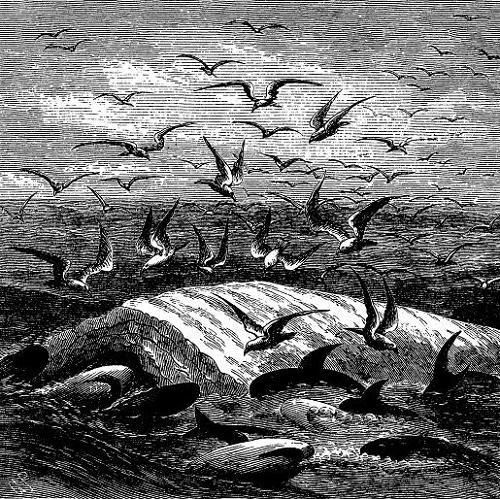 CARCASS ADRIFT When the whale has been killed and is hauled alongside the vessel, the "cutting in" process is begun. This is surgery on the largest scale known. The immense carcass is brought underneath some elaborate tackle rigged on board. From the head of the mast two great sheave blocks depend, a rope about eight inches in circumference running through them. The rope also passes through a corresponding traveling block, to which, in the beginning of the operation, a heavy iron hook is attached by a clevis and bolt. The fall leads to the windlass, near which a number of men stand ready to lend a hand. The rail and side planks above the deck of the vessel are all removed, and two platforms, or gangways, are erected over the side in front of the opening thus formed. The whale is next brought directly underneath the hoisting tackle, which swings above the platforms. On these, secured by ropes around the waist, the officers are stationed, and provided with broad-edged tools called spades, which are mounted on sixteen-foot poles. A circular flap is cut from around the whale's eye. One of the boat-steerers now appears, dressed in a rough woolen suit. Secured by a rope fastened around his waist, he is lowered on to the whale's back, and inserts the hook of the tackle in the eye. This is a dangerous duty in a heavy sea, the smooth skin of the whale affording but a poor footing, while a score of sharks are nibbling around, and the ponderous hook and block are swaying with the roll of the ship. When the hook is inserted the order is given to "haul taut" and "heave away," and the flap, technically the blanket, or blubber, slowly ascends beyond the deck until it reaches three-fourths of the height of the mainmast. A second boat-steerer then cuts an oval plug from it, which is secured by other tackle, both parts being afterward lowered into the blubber-room. The first cut is extended to other parts of the body, the head excepted, which is reserved for the last, and the windlass is constantly working until five hundred or more feet of the blanket have been brought on board. When every bit of the carcass has been stripped of blubber, it is turned adrift and floats away, coloring the water by its oozing blood, and attracting a shoal of sharks and a flock of albatrosses, which hold carnival in the sea and air over the fallen majesty. |
The head is one-third the entire length of a sperm-whale, and in obtaining the valuable spermaceti which it contains the whalemen divide it into three parts - the "case," the "junk," and the bone. The "junk" is first hauled on board and stowed away, and then the "case" is bailed. You will find an illustration of this operation below. The "case" is a massive part of the head, cellular in the interior, the walls of the cells running vertically and transversely. It is filled with an oily substance of a faint yellow tint, translucent when warm. The oil-bearing flesh forms about one-third of the mass, and in a large whale it has yielded three and a half tons. The case also contains the respiratory canal, and a cavity of extraordinary depth filled with oil. An opening is made at one end for the purposes of bailing, and it is next hauled to a vertical position beyond the reach of the water. A deep and narrow bucket attached to a line and pulley is then lowered, and brought up full of transparent spermaceti, mixed with silky integuments having the odor of freshly drawn milk. The sore hands of the crew, bathed in this rich substance, are relieved and healed, and the greenhorns dabble in it with the ineffable satisfaction displayed by city youngsters in a mud puddle. 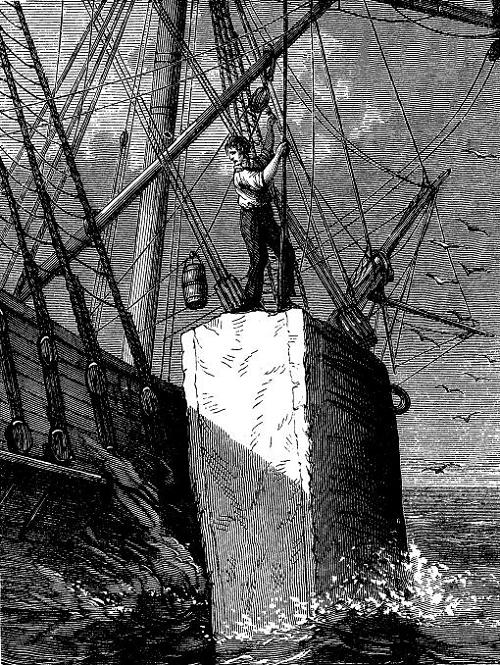 BAILING THE "CASE". As soon as the case has been emptied it is abandoned, and the "try-works" are brought into use. The "try-works" are one of the disfigurements that cause merchantmen and man-of-war's men to laugh at whaling vessels. They are boilers set in a foundation of brick on the deck, and are used for reducing the blubber to oil. The mainyard is taken aback, the mainsail and top-sails are furled, and, while the vessel drifts in her course, the fires are lighted. "Trying out," as the work is called, is one of the most wearisome and offensive of the whaleman's toils. Captain Davis states that he never experienced six hours of greater wretchedness than those during which this operation was performed on his first whale. The scene on board is weird in the extreme. Red flame and smoke issue from the flues and shoot into the black night, bringing the outlines of the masts and rigging into strange relief. The feet of the men slide over the wet and slippery deck at every roll of the ship, and their clothes are wet, sooty, and greasy. If the greenhorn has not yet repented, the words of penitence will surely, come to his lips in the "trying out." The orders of the officers are harsher than ever, and the men swear sullenly in rejoinder. In fact, the ship becomes for the time "a little hell on earth," and we can scarcely wonder that English sailors avoided so unpleasant an occupation. With every whale caught the drudgery is repeated, and sometimes the decks have been no sooner holy-stoned and the brass-work polished than the furnaces are again lighted. The chase is magnificent |
sport, but the "cutting in" and the "trying out" have an opposite equivalent in horrors. 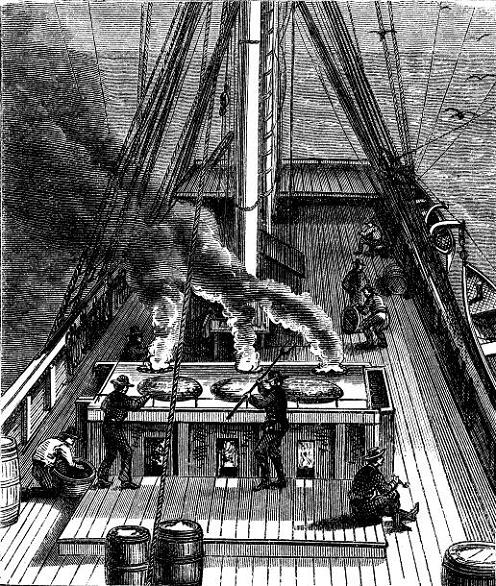 "TRYING OUT." The cruise after sperm and right whales in the Pacific is a long and dreary one. It generally lasts for three or four years, and there are few incidents to vary its monotony except the excitement of the chase. Calls are made occasionally at South American ports, where the sailors find dirt and debauchery in abundance, and frequently manage to get into conflict with the petty authorities; at the volcanic Galapagos, where delicious terrapin are more plentiful than clams on Long Island, and afford a welcome change in the vessel's dietary, which ordinarily consists of salt pork and mouldy biscuit; at the evergreen Cocos Island, a land of leaf and flowers, where the purest water is found; and at Sandwich Island ports, where the smooth-tempered Hawaiians exchange innocent hospitalities with the sailors, and even extend them so far as to also exchange names and clothing during the vessel's stay in port. But it is time that we said something about the form and habits of the whale itself. A great diversity of opinion exists on the subject, and an old tar once averred the number of tails a whale carries depends altogether on the quantity of grog the looker-on has drunk. Such authorities as we have had differ most widely, but Captain Davis's observations were submitted to an assemblage of old whalemen at New London, who unanimously indorsed their accuracy in all except two or three minor points. One of the most interesting peculiarities of the whale is its immense loss of blood in death. It is presumed to have a large supply arterialized in a reservoir, which is brought into use when that in general circulation becomes vitiated during a prolonged submergence. This reservoir is what whalemen term the "life" of the whale, and is the spot sought by the harpoon and lance. When touched, Captain Davis states, the bloody torrent surcharges the lungs, and is expelled through the spout-hole. Suffocation and death follow, but when the wound is only slight the agonies of the dying beast are considerably prolonged. The poor creature will lie on the surface feebly propelling itself onward, and, with quick-repeated sobs, will pour out its life by slow degrees, coloring the surface of the ocean with a deep crimson. From this stupor it is aroused to its last struggle. The head rises and falls, and the flukes thrash the water rapidly. With great speed it will swim in a large circle two or three times, and then fall on its side dead, with "fin out." The length of time a whale can remain below the surface is probably much greater than has hitherto been allowed. Sometimes, notably during the full of the moon, the whales abound over the feeding ground, and many are taken. But the busy season is followed by a period of two weeks or more during which none will be visible. Vessels will be spoken from all points of the compass, and to the question, "Have you seen whales?" the answer will be, "Not for a week or ten days." The busy and dull seasons |
alternate uniformly over an area of six hundred miles north and south by nine hundred miles east and west. Bull whales often appear as though they have been reposing on a muddy bottom, and off the coast of New Zealand they have been seen with such barnacles on their lower jaws as are found on a ship's bottom. In the same connection Captain Davis states an ingenious theory, which we will quote in his own words as nearly as we can remember them. "The 'case' and 'junk' of the largest spermaceti may attain a length of twenty-five feet, a depth of eleven feet, and a breadth of nine feet, with a total weight of sixty thousand pounds. There is nothing to break the alabaster color of the interior, nor any tubular structure, save the breathing pipe. Yet the animal heat of this part is as great as though the circulation was perfect. Now blood is generally regarded as the common carrier of animal economy; but in this case the building and wasting processes are conducted twenty-five feet from the presence of blood, with which the other parts of the whale's body are proportionately more highly charged than land animals. What are the uses of this immense mass? Most writers believe that it acts as a buoy to lift the nostril above water. But, in truth, the head is much less buoyant than the body, owing to the heavy casing of 'white horse;' and when the whale dies the head turns spout-hole down and bony jaw upward, showing the part containing the fatty matter is the heaviest." With these facts as a basis, Captain Davis believes that the sack of oil has a use in the whale's submergence. It is commonly conceded that whales have a mysterious power of communicating with each other, and instances are mentioned which, if trustworthy, afford the strongest proof possible. Stationed at the mast-heads of their vessels, captains have observed that when their boats were attacking a whale to the leeward, a school several miles to the windward, and out of sight of the combatants, would show signs of alarm, and retreat the moment the first blow of the harpoon was struck. Sound was not the means of communication, as the distance was too great, and furthermore it is a well-ascertained fact that whales only signal by sound in the practice of "lob-tailing." In "lobtailing" the whale rises perpendicularly in the water, with its head downward. Thus poised, it will swing from side to side, sweeping a radius of thirty feet with awful violence. The concussions of its body with the water may be heard for many miles, while the sea is a mass of foam and the air is filled with spray. The practice is supposed to be intended for amusement, but it is also a tocsin. "Breaching" is another strange habit common in all varieties of the whale. It consists in the whale's elevating three-fourths of its body ont of water, and then falling heavily on its side. In "sounding" the whale raises its head a few feet out of the water, gives a long spout, rounds its back, and revolves as on an axis. Rounding higher by degrees, it gently lifts its massive flukes without the least spray to a surprising height, and the next moment it smoothly disappears beneath the surface in a perpendicular descent. Considering the size and the apparently unwieldy proportions of the monster, the litheness with which it executes these movements is extraordinary. The sea is not distnrbed, and not the least sound is heard. "Sounding" is a certain indication of sperm-whale on a cruising ground, as the right-whale is never found in water so deep that the act is possible, and as the humpback and sulphur-bottom whales do not intrude on sperm-whale ground. Unless it is disturbed by the hunters, the sperm - whale always descends in this manner. Another manoeuvre is" settling," which is often a means of safety to the whale when diving or running will not avail. From a position of inaction the whale can suddenly sink without a stroke of the tail or fins, and without any apparent effort. It is as a mass of lead, and sinks from the head of a pursuing boat so rapidly that the harpoon may be darted but not delivered. Many whales thus escape. The speed of the sperm-whale and the regularity of its movements are scarcely less wonderful. A vessel once gave chase to a whale, and ran after it at the rate of ten knots, with yards squared and every stitch of canvas stretched. But during twelve hours of daylight she did not gain one knot on the whale, which passed from sight. In other instances captains of vessels have carefully ascertained the course of a fleeing whale in an afternoon's chase, and have followed it during the night. At the return of daylight the same whale has still been in sight ahead or astern, having stood through the dark on the course in which it started. On one other occasion a whale began a chase to the windward as soon as he was struck, towing the boat after him. The ship followed with a full top-sail breeze, but in four hours the whale and the boat in tow were lost to sight. A large sperm-whale will produce about one hundred and seven barrels of oil. Its length is about seventy-nine feet, its height at the forehead eleven feet, and its width nine or ten feet. It has about fifty teeth, the heaviest of them weighing about one pound and a half. According to Captain Davis the skin is not naked. Beneath what is called "the black skin" a curdy deposit is found, which is easily scraped away after the death of the animal, and reveals a close fur one-eighth of an inch in thickness. This fur envelops the |
entire surface, and has root in the true skin or blubber. The flesh is a dark red, very firm, and of the texture of rope-yarn. It is fit for food in an emergency, but is not sought by epicures. The average temperature of the blood is 104x Fahrenheit. The whales are gregarious in their habits, but the old males are often found alone. Their ordinary rate of travel is about five miles an hour, although they far exceed that when urged by the hunters. The young are said to measure fourteen feet in length at their birth. How long they remain with their mother is unknown, but the herd watches them until they attain a considerable size. The milk is white and fatty. They are supposed to live to a great age; and, apropos, a story is told of a sailor whose boat was wrecked, while he and his messmates were tossed high into the air, by a mad whale's flukes. As he came down, after half an hour had elapsed, the whale awaited him with open mouth, and instead of sinking as deeply into the sea as he had been high in the air, he slid smoothly into the whale's interior. As soon as he recovered breath he drew out his tobacco-box and helped himself to a liberal "quid," which he rolled over and over in his mouth as he laughed at his adventure. Presently he arose from the soft but moist couch on which he had been thrown, and surveyed the apartment, which contained many wonders, you may be sure. Some writing on one of the walls attracted his attention, and on examination it proved to be the words, "Jonah, B.C. 862." This amused him so much that the "quid" fell out of his mouth, and the whale at once began to writhe and show a violent dislike to the nicotine. A happy idea occurred to him, and he cut his plug of tobacco into small pieces, which he distributed over the floor. The whale then heaved more violently than ever, and while Jack was holding his sides at the joke, he was shot into the water and almost on board one of the ship's boats. Some of his comrades doubted his wondrous story, but, for the benefit of unbelievers, he had brought back with him a pocket-knife with a buckhorn handle on which were stamped Jonah's initials and an American eagle. The whale's mouth is out of proportion to its other parts, and is so narrow, comparatively speaking, that one might suppose the animal would have difficulty in entrapping its prey. But its food is the voracious cuttle-fish, or "squid," which is found at great depths, and is allured by a white and shining object. The jaw and tongue of the sperm-whale are of silvery whiteness, and thus nature enables the creature to overcome the defect. The sperm-whale only frequents deep water; the male is much larger than the female; the upper jaw, the "case," and the "junk" form the greater portion of the head; and the under jaw is supplied with ivory teeth. The right-whale is found only in soundings off the coast; the female is larger than the male; the lower jaw, with its lips and tongue, is much larger than the upper jaw; neither the upper nor the lower jaw is supplied with teeth, the upper jaw having great slabs of whalebone instead. The sperm-whale is the more combative of the two, and no large bull whale of its species is taken that has not been scarred by the teeth of its rivals. The sperm-whale is dangerous to the huntsmen at each end. The motions of its flukes are limited; but, to compensate for this, it is possessed of admirable skill in fencing with the jaw. The right-whale's jaw is not dangerous; but it is more active and powerful with its flukes than the sperm-whale; and there is a spot on the upper jaw which is seemingly as sensitive as the antennae of an insect. However swiftly a right-whale may be advancing on a boat, a slight prick on this point will suddenly arrest his movements, and he will not advance a yard farther, but will either descend, back, or turn to the right or left. A large-sized right-whale will afford three hundred barrels of inferior oil and three thousand pounds of bone. The golden days of American whaling are over. In the Revolutionary war Nantucket alone lost by capture 134 vessels, and the war of 1812 was also disastrous. But from both of these calamities the whalers recovered, and, as we have already shown, the whaling fleet of the United States consisted, in 1840, of over 670 vessels, with a capacity of 220,000 tons. The introduction of petroleum materially reduced the demand for and the consumption of whale-oil, however, and the trade received a serious blow when the rebel cruiserShenandoah destroyed thirty-four United States vessels on the arctic ground. At present the fleet numbers 203 vessels, showing a decrease of fifteen per cent. per annum for the past two years. Our entire import of sperm and whale oil in 1872 was about three-fourths of our import of sperm alone in 1853, and one-fourth of our import of whale-oil alone in 1851. Our import of whalebone in 1872 was only one-twenty-eighth of the import of 1853. No whaling grounds have been abandoned, and every sea and ocean are still explored by American whalemen. But it is believed that the arctic fishery will be discontinued soon, as the perils that attend vessels visiting it have caused the demand of an increased rate of insurance. Nevertheless the arctic fleet in 1873 numbered about thirty-two vessels, although the disasters of the previous year were numerous. The profits of whaling are exceedingly small, and the wealthiest capitalists engaged in it are seeking other employments for their ships. |
Source"Huntsmen of the Sea",
Last updated by Tom Tyler, Denver, CO, USA, September 23, 2018.
|